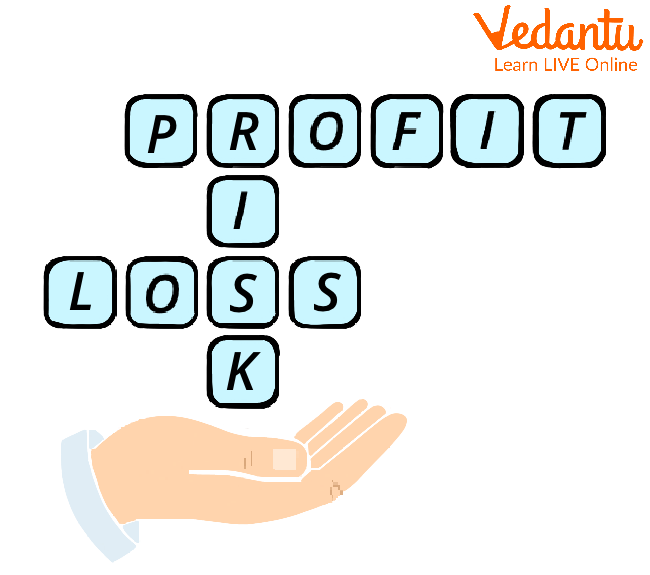




Define Insurance Claim Accounting Loss of Profit Policy
Businesses can insure stock loss from fire, flood, theft, earthquake, etc. Since insurance is indemnity, only loss can be claimed. Businesses often insure against profit loss due to lower sales, higher costs, etc. When the policy also covers losses caused by the loss of stock, it is called a loss of profit policy. The loss of profit policy is also known as Consequential Loss. Profit and Loss are calculated at the stage of summarising.

Know about the Loss of Profit
The insurance claim accounting loss of profit can be changed to cover any risks that aren't covered, as long as both parties consent and pay any extra fees. If the insurance company agrees, massive storms, floods, water leaks, impacts, broken machinery, etc. may cause damage.
If the goods are fully insured, the claim amount matches the actual loss unless they are destroyed. Underinsurance, where the stock's insurable price is higher than the sum insured, limits the claim amount to the policy amount. You can access the fire insurance claim pdf with the insurance claim formula online.
Defining Insurance Claim Accounting

Meaning of Insurance Claim in Accounting.
Each business keeps enough stock to meet the needs and size of its company so that it can run smoothly, but there is also a risk of loss by fire or other means. Most companies purchase insurance policies to protect themselves from unexpected losses. One type of policy called a "stock policy" covers stock loss due to fire.
The Standard Way that General Insurers Handle Claims
Any loss covered by an insurance policy must be reported to the insurance company as soon as possible or as soon as the insurance company allows.
When a general insurer gets this kind of message, they must respond immediately and tell the insured person precisely what steps to take.
When evaluating the loss, the contractor must follow the rules of conducting of the Authority. He must report his findings to the insurer within thirty days of being hired, and the insured can get a copy of the document if he wants to.
If the payment is late, the insurer has to pay interest at a rate of 2% higher than the bank rate at the start of the financial year during which the claim is reviewed.
Treatment of Goods Destroyed by Fire And Insurance Claims

Defining Fire Insurance & taking claims for it.
You could buy fire insurance or a separate policy as part of your property insurance. It gives money to cover the costs of replacing, repairing, or rebuilding a property damaged by fire. Because it's hard to predict how much damage will be caused by a fire, this policy has a fixed upper cap on the amount of money it will pay out. Once you file a fire insurance claim, you get the sum you lost or the most you agreed to pay.
An abnormal loss of goods is when things are lost because of fire, theft, or an accident. If these goods were covered by insurance by the firm, the insurance company could pay the claim in whole or part. The said change will have the following effect on the final accounts:
The cost of goods lost or damaged is either deducted from items purchased or listed on the credit column of the Trading Account.
The account's debit side for profits and losses must show the net deficit, which is the gross loss minus any acknowledged insurance claims.
Accepted insurance claims will be listed on the Balance Sheet's assets.
Free samples of goods are sometimes given out to try them out and get the word out. It should be handled the same way in the final accounts as in the trading account. In contrast, it appears as an advertisement on the debit column of the report for profit and loss.
Conclusion
The business must get insurance on its assets to protect against theft, mistakes, and other problems. To get insurance, they contact insurance businesses and pay a fee for the policy to be issued. In addition to the cover, the insurance policy lists the details of the things it will protect. The claim is made when there is a problem with an asset during the time covered by the insurance policy. The insurance provider promises to pay the insurer once the claim has been verified.
FAQs on Loss of Profit Policy: Meaning and Significance
1. What is a Loss of Profit insurance policy?
A Loss of Profit policy, also known as Business Interruption or Consequential Loss insurance, is a type of coverage that protects a business against the loss of income following a disaster. While standard fire or property insurance covers the physical damage, this policy covers the financial losses, like lost net profit and ongoing fixed costs, during the time the business cannot operate normally.
2. Why is a Loss of Profit policy so important for a business's survival?
This policy is crucial for business continuity. After an incident like a fire, a business might have its physical assets replaced by fire insurance, but it still cannot earn income during the rebuilding period. A Loss of Profit policy helps by providing funds to:
- Pay for fixed expenses like rent, salaries, and utility bills.
- Cover the net profit the business would have earned.
- Ensure the business can resume operations without facing a severe financial crisis.
3. How is a 'loss of profit' claim different from a 'loss of stock' claim?
The difference is fundamental. A loss of stock claim compensates the business for the cost of the physical goods or inventory that were destroyed. In contrast, a loss of profit claim compensates for the income the business would have generated from selling that stock and its other operations if the disruption hadn't occurred. One covers assets, the other covers earnings.
4. Can you provide a simple example of how this policy works?
Imagine a retail shop is damaged by a flood and must close for two months for repairs. Its fire and flood insurance will pay to fix the building and replace damaged goods. However, during those two months, the shop has zero sales but still needs to pay rent and employee salaries. The Loss of Profit policy would step in to cover these ongoing expenses and the profit the shop would have typically made in that two-month period, helping it stay financially stable.
5. What is the 'Indemnity Period' in a Loss of Profit policy?
The Indemnity Period is a critical term in the policy. It refers to the maximum length of time for which the insurance company will pay for the loss of income after the disruptive event. The business owner chooses this period (e.g., 6 months, 12 months) based on how long they estimate it would take to get the business back to its normal operating level.
6. How does a Loss of Profit policy relate to a standard fire insurance policy?
A Loss of Profit policy is supplementary and almost always requires a standard fire or property damage policy to be in place. A claim under the Loss of Profit policy is only triggered if the initial property damage is covered by the primary fire policy. In simple terms, the fire policy covers the cause (physical damage), while the Loss of Profit policy covers the consequence (financial loss from disruption).























